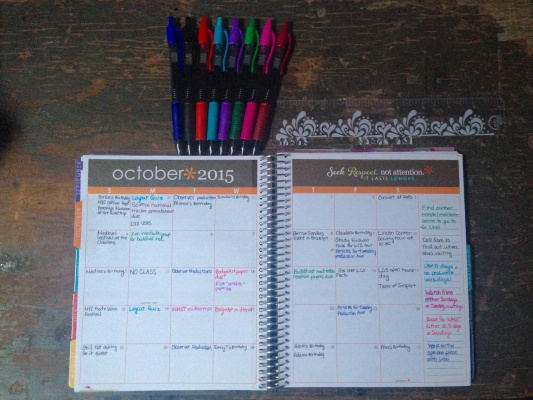FCLC’s School Survival Guide: 30 Percent of Your Grade
With so many options for planners available, there’s an organizational system for everyone! PHOTO BY: ALYSHA KUNDANMAL / THE OBSERVER
October 1, 2015
One of the worst possible pieces of information you can acquire in a college class is learning that you have a test in said class that day. The stomach-drop feeling that mirrors the ones from roller coasters is awful, and experiencing it at all, let alone in a classroom can be terrifying. No one wants to be the first one to make this mistake. Here’s how to avoid the pitfalls that accompany tests, papers and anything else worth 30 percent of your grade.
Write it down: Get a calendar or a planner and go through each class syllabus. Write down all the tests, quizzes and papers you have for the next month on the dates they will happen. Do this for each class, and color code them so you can tell which is which. Your October calendar may look overwhelming at first (or, if you’re anything like me, an organizational dream), but being able to prepare for tests and papers in advance will pay off in the long run. Also, you’ll never have to send the panicked text at 11 p.m. asking, “We have a history paper due tomorrow?!” to as many people as you can think of who are in that class.
Ask for clarification: A syllabus is not written in stone. It is quite malleable, especially in digital form, and is at the discretion of the professor. Dates for assignments change all the time, and sometimes (unfortunately) on short notice. If the dates on your syllabus aren’t quite matching up with what you’re discussing in class, ask your professor if the due date of the paper has moved, too. While it may seem sensible to wait until the end of class to ask, don’t. Ask in front of everyone; that way, your professor can address it during class, instead of adjusting the syllabus afterwards but forgetting to email everyone else the changes. Everyone will thank you and definitely have your back if you get confused next time.
Go to office hours: Tess Fahey, Fordham College at Lincoln Center (FCLC) ’16, cringes remembering, “My first test, I actually bombed. It was because I didn’t talk to the professor and figure out what I really needed to study; I studied everything wrong.” When you have more personal concerns or questions that would take up too much class time, or would just like some individual face time with your professor, look to the top of your syllabus for where and when their office hours are. While it may seem a little intimidating at first, professors are generally very welcoming and extremely helpful to students who stop by. Professor Elisabeth Frost expressed, “I’m kind of amazed at how little office hours are actually utilized, so I would advocate for reaching out to professors.” All professors are required to have office hours, but they are seldom taken advantage of.
Do the math: Your grades in college are broken down into much larger percentages than they were in high school. Your whole academic career thus far, teachers have encouraged you to do your homework and participate in class simply because they were “easy points.” These were the types of small, low-stakes assignments designed to prop up your grade. If you didn’t do too well on a test, it wouldn’t keep you from passing the class because you had a homework cushion. It essentially worked as an insurance policy. By now, you’ve probably noticed that there isn’t a lot of homework that you have to physically hand in to your professor. This makes studying for your tests and giving yourself ample time to write your papers crucial. If you neglect to study for your midterm, that’s a hefty quarter of your overall grade that’s suffering, jeopardizing your opportunity for an A in the class.
What will help you earn an A in your classes are these tried-and-true tips! So make sure to keep yourself organized this semester with this recap list of DOs and DON’Ts.
DO: Write your assignments down.
DO: Go to office hours.
DON’T: Get caught off guard by due dates.
DON’T: Rely on a homework cushion.












